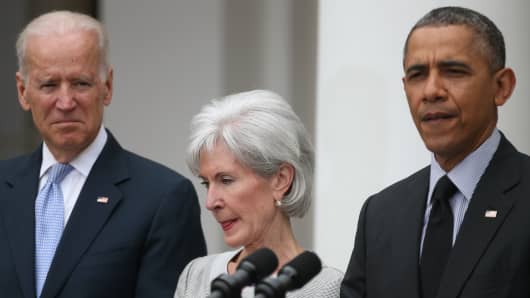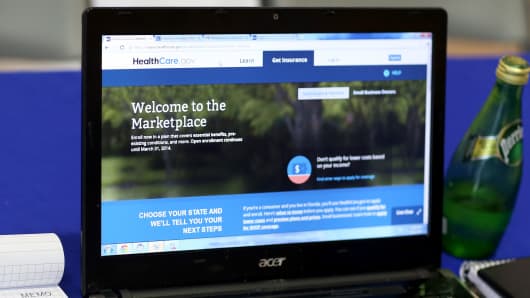If you wake up tomorrow and hear a top U.S. court has issued a ruling that could end up effectively destroying much of Obamacare, don't say we didn't warn you.
At stake are the subsidies that more than 5 million people have already received to help them buy health insurance through HealthCare.gov, the federal Obamacare exchange that sold insurance in 36 states this year.
In a nutshell, plaintiffs in the case Halbig v. Sebelius claim those often-valuable subsidies are illegal because the Affordable Care Act only authorized such tax credits for people who bought insurance through one of the exchanges originally set up by an individual state or the District of Columbia—not the federal exchange. Nearly 90 percent of the people who enrolled in plans via the federal exchange qualified for those subsides because they had low or moderate incomes.
Take away those subsidies and many, if not most, of the enrollees on HealthCare.gov might not buy insurance next year because they will find it unaffordable at the full premium price. That, in turn, could create a much-feared "death spiral," where insurance pools have too many sick enrollees and not enough young healthy ones, and premium rates skyrocket.
And if those subsidies are not available to individuals in the states served by HealthCare.gov, it would also mean that businesses in those states could not be mandated starting next year to offer affordable health insurance to their workers or pay a fine. That's because the so-called employer mandate is linked to the availability of those subsidies for workers who opt to buy individual insurance.
"If the courts were to decide that the Halbig plaintiffs were right, it would be a huge threat to the ACA," said Timothy Jost, a professor at the Washington and Lee University School of Law, and leading Obamacare expert. "This is a real bomb-thrower."

Mark Wilson | Getty Images News
President Barack Obama, then-outgoing Health and Human Services Secretary Kathleen Sebelius, and Vice President Joe Biden at an event in the Rose Garden at the White House, on April 11, 2014.
As early as Tuesday, the U.S. Court of Appeals for the District of Columbia Circuit could issue a decision in that case, which is well-known among Obamacare experts, but largely unheard of by the general public.
Oral arguments heard by a three-judge panel on that court in March—when two of the judges appeared sympathetic to the plaintiffs—gave Halbig supporters renewed hope that their claim will prevail.
"This has been under the radar for so long," said Michael Cannon, director of health policy studies at the libertarian Cato Institute, one of the architects of the argument used in the Halbig case and in three other similar, pending federal court challenges to Obamacare. Halbig is expected to be the one decided at the appellate level first, although another one that was originally filed in Virginia federal court is also on the verge of being decided in the 4th U.S. Circuit Court of Appeals.
Cannon's argument focuses on several sections of the law, particularly one phrase saying subsidies can be issued "through an Exchange established by the State under (section) 1311 of the Patient Protection and Affordable Care Act."
At the time the ACA was passed into law, many expected that most, if not all, states would set up their own Obamacare exchanges—but when most states didn't, the federal government stepped in and set up HealthCare.gov to sell insurance in those states.
In studying the law three years ago, Cannon focused on the language detailing an exchange run by a "state" being able to sell subsidized insurance. He then argued that because the federal government is not a "state," it is not empowered to sell subsidized plans through its own exchange.
The Obama administration and its supporters "are claiming powers that Congress never gave them, the powers to tax millions of employers and individuals" to fund billions of dollars of subsidies distributed through the federal exchange, Cannon said.
"Supporters of the law have said that this will pose an 'existential threat' to the law" if that claim prevails, Cannon said. "If that's true, what that means is that Obamacare cannot survive unless it has a buy-in from the states that it never has had."
But, Cannon said, "no one really knows what the impact will be."
However, even Cannon's staunchest opponents agree that a decision that accepted his claim would seriously harm Obamacare if it survived further legal scrutiny.
"It's a very big deal," said Ron Pollack, founder of the health-care consumers advocacy group Families USA, and Enroll America, the group that was a major force in pushing people to sign up for Obamacare.

Getty Images
People sit with an insurance agent from Sunshine Life and Health Advisors as they try to purchase health insurance under the Affordable Care Act at the Mall of the Americas in March 2014 in Miami.
Pollack noted that the more than 5 million people who have received subsidies via HealthCare.gov "would have them taken away!"
"It certainly would cause a lot of people to rejoin the ranks of the uninsured," Pollack said. "The provision of the tax credit premium subsidy makes a huge difference in terms of whether people considering enrollment or enrolling in coverage will find such coverage affordable."
ACA supporters strongly disagree with the claims made in the Halbig case, saying they focus on a narrow part of the law.
Read MoreThe underworld of cheap drugs
"It's a selective reading of the statute," said Jost, the health law professor at Washington and Lee University. "If you just take the four words, completely out of context ... you can read it the way they do, but that's frankly not the way courts read statutes."
"You look at the entire statute, you look at the purpose of the statute, you don't cherry pick," Jost said. "They just made this stuff up."

Getty Images
Jost said the record of debate over the law shows that both Republicans and Democrats understood the ACA would allow the establishment of Obamacare exchanges, both state and federal, and that there would be subsidies granted to enrollees.
In other words, he said, the intent of the overall statute was to provide subsidies on Obamacare exchanges to help people comply with the mandate requiring most Americans to have some form of health insurance by 2014 or face a tax penalty.
Jost also said there is no evidence, at any point, that it was said or that states understood that if they did not set up their own exchange then the residents of their states would be ineligible for subsidies to buy insurance.
And he pointed out that congressional leaders involved in passing the law filed a legal brief saying it was never their intention to have the federal exchange be barred from having subsidies used by customers.
Pollack said, "It's not a narrow reading" of the law, "it's a total misreading of it."
Read MoreHobby Lobby outrage? A simple fix
But for Cannon, the language is clear, and subsidies can only be issued through state-run exchanges, not a federal exchange.
He said the Obama administration could seek to fix the problem by asking Congress to amend the law, but "they are afraid" what will happen if Congress reopens debate over the ACA.
"The only way you're going to get a fix through is major revision, and that might include a major scaling back of the law," Cannon said. "And that's democracy. And that's what the Obama administration's vision of the law is trying to subvert."
While Pollack and Jost don't agree with Cannon's analysis of the ACA, they do agree with him that the oral arguments in the D.C. Circuit Court in March seemed to offer the Halbig case a renewed chance to stay alive, and thus to continue threatening Obamacare.
"You get two judges on the judicial panel in the second highest court in the land asking some really hard questions about how you're violating the intent of the law," Cannon said of those arguments.
A split decision seems likely, all sides agree. Cannon and his allies are hopeful it will break their way.
But while their opponents think that is possible, they don't believe the Halbig arguments will prevail in the long run and result in the end of HealthCare.gov subisides.
"I feel rather confident about that," Pollack said.
That confidence is partly based on an analysis of the tough legal path the case would have to cross before its claim became accepted as the law.
If the Halbig plaintiffs win their appeal, Pollack and Jost both said they expect the Obama administration to immediately request a review of the decision by the entire 11-active judge lineup of the U.S. Circuit Court for the District of Columbia—a so-called en banc review.
And of the three judges who heard oral arguments in the cases in March, two of them—the ones considered most likely to side with Halbig—will not be part of an en banc review because they have senior judge status, as opposed to active status on the court.
At the same time, another similar case is pending before a panel of judges in the 4th Circuit Court of Appeals, where Cannon said, "I'm not optimistic" of the claim winning there.
Plaintiffs in the cases based on Cannon's claim could, if they lose at the appellate level, ask the Supreme Court to hear their claim. But there is no automatic right to appeal to the high court, and if the circuit courts aren't split in their decisions, it makes it less likely that the Supreme Court would take the case to resolve the dispute.
Jost, for one, is skeptical that even if the Supreme Court took the cases, it would rule that the subsidies on the federal exchange are illegal.
"I think they've done this once, and they don't want to do it again," Jost said.
He noted that in 2012, the court split 5-4 in voting to uphold most of Obamacare, including the individual mandate. In that decision, Chief Justice John Roberts, a conservative, shocked and angered many Obamacare opponents when he voted to uphold the law.
—By CNBC's Dan Mangan
No comments:
Post a Comment